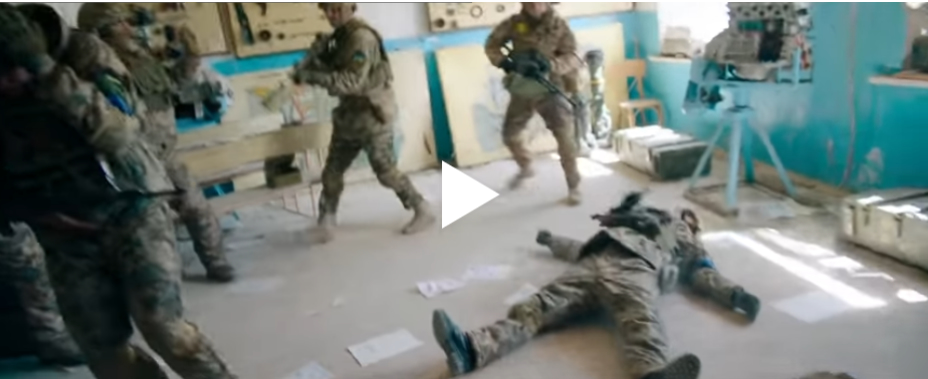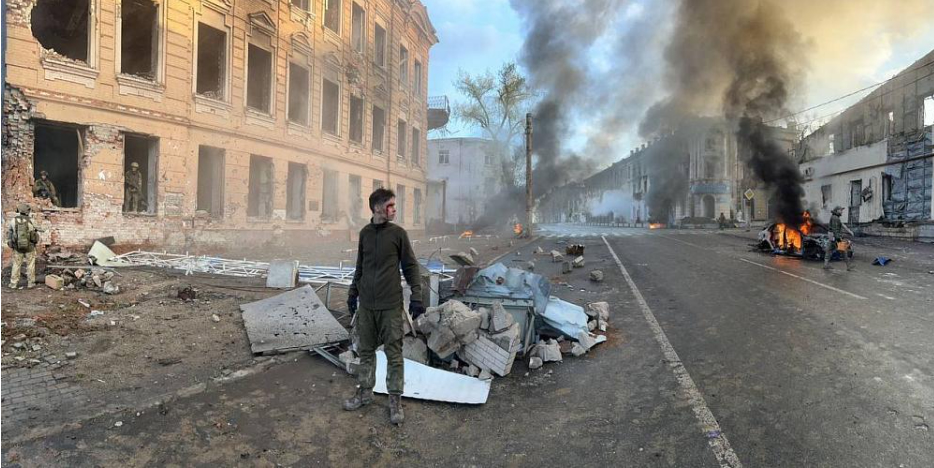
Through their attempts to combine patriotism, historical revisionism, and nationalist fervor, Russian filmmakers have crafted a cinematic landscape that not only glorifies their country's military aggression but also seeks to justify the full-scale invasion in Ukraine. Russian President Vladimir Putin instructed the Ministry of Culture to ensure the screening of documentaries about the "special military operation" in Ukraine and about the fight against the spread of "neo-Nazi ideology."


This is a four-part series produced by Russia's state-run Perviy Kanal which attempts to justify Russia's actions in Ukraine under the guise of defending Ukrainian citizens. It debuted on the two-year anniversary of the start of Russia's full-scale invasion. Its narrative centers on the battle for Mariupol between the Russian Somali battalion and the Ukrainian "Nazi Azov," portraying Ukrainian forces as ruthless aggressors. The series goes to great lengths to depict Russian soldiers as valiant protectors of innocent civilians, contrasting them with the purported brutality of Ukrainian forces.


According to the propaganda storyline, the Azov fighters are absolute beasts who ascribe no value to the lives of others and who fire upon Russian "peacekeepers" directly from civilian buildings.


After being fired upon, the Russian tank begins shooting back, thus showing that Russians will never strike unless provoked.
Filming began in the spring of 2023, with much of it taking place on site in Mariupol, surrounded by all the destruction caused by the Russian siege. Other scenes were filmed in Russia.
The most interesting thing is that the series tries to convince ordinary Russian viewers that "Russians don't abandon their own," one of Russia's mottos of the war uttered by the main character.


The series tries to portray the Ukrainian military as entirely inhumane. In one scene, a Mariupol civilian is looking for help for his wounded wife, who was taking refuge in a basement. Firstly, the man asked the Ukrainian military for help but they refused. However, Russian soldiers took care of the man's wife, providing necessary medical treatment with painkiller injections.

Azov, on the other hand, is shown as hiding behind the civilian population, particularly women and children, in a school building. In addition, one of the soldiers does not agree with the commander's order. As a result, he was killed by the commander in front of the rest of the Ukrainian military. Thus, the series aims to portray Azov as "a band of murderous thugs".

It is also worth noting that at the beginning of the series, the main character is shown as against the "special military operation," she changes her view over time as she discovers all the horror with which the people of Donbas are forced to live.
According to the series, even Russian State Duma deputies are fighting at the front,thereby showing the viewer the importance of the endeavor and that Russian leadership is dedicated to the fight. They also portray Russia's wanton violence as effortlessly cool as they show Russian soldiers delivering clever quips as they blow up the city with artillery.

There is also a dialogue in the series between two Russian fighters who are surrounded by Azov.
⁃ Time to die for the Motherland.
⁃ What is the Motherland for you?
⁃ For me, the Motherland is what I cannot live without and what I am ready to die for. These guys below us(Azov), they are the same as you and me, but I will not and cannot live like them.
⁃ How is that?
⁃ How, how... In anger! Angry and without memory. Look how broken the city is . It was built by two empires: Russian and Soviet. And there was enough room for everyone! And this is cramped from our mere existence and from the fact that we are always nearby. So they fell for Western fairy tales.
This is what Mariupol looks like through the eyes of Russian propaganda and its attempts to blame Ukraine for the consequences of Russia's murderous aggression.

Of course, the series neglects to note that Mariupol was turned to ruin by the Russians who came to "defend" the city.

This series by Donetsk director Vladimir Agranovich takes place in Russian-occupied Donetsk Oblast in February 2022, during the first days of Russia's full-scale invasion of Ukraine. It centers on three friends, who each have different reactions to the beginning of the war.

One of the ideas described during this film is to portray Russia as "having been provoked by Ukraine and NATO" to invade first. Russia is shown as having tried to establish a productive dialogue with Ukraine, but to no avail. The main character sits at home and anxiously reads the news. In the first episode, one friend criticizes the Minsk agreements, which no one has been able to "fulfill for 8 years," while a lot of people were still dying. But he also has great enthusiasm in remembering Russian militant commanders Givi and Motorola as shining examples of patriotism.
The second character, one of the friends, a soldier, volunteers to fight, but loses his foot to a mine. The second friend is conscripted and sent to the front, where he is captured by Ukrainian forces and executed. The series thus tries to convince its viewers that Ukrainians are remorseless murderers. Through the action of the series, the main character grows to fully support the war, and later goes to the front as a war correspondent.

The series claims to have been filmed entirely in Donetsk "under shelling and bombing from the front."
Like the Perviy Kanal series, Mobilization tries to convince its audience of the righteousness and necessity of Russia's aggression. Rather than focusing on the Ukrainian enemy, this series centers on people in Donbas who become convinced of the righteousness of Russia's full-scale invasion as a necessary defense against NATO's provocations. It thus teaches its audience that Russia's war is really defensive in nature, and is the only choice to protect Russia and the people of Donbas.
This film debuted in October 2022,
notably before the aborted rebellion by Wagner forces in June 2023. In the "documentary", units on a "white" team carry out an assault operation to capture buildings. Their task is to occupy an observation post and direct attack aircraft to targets behind enemy lines. They are opposed by units on a "yellow" team, who have dug in in these buildings and are also ready to fight to the end.
"We have a contract. A contract with the company. A contract with our homeland. With our conscience. We know we're going to hell. But in hell, we will be the best."

The film is essentially a recruiting advertisement for the Wagner mercenary company,
both encouraging its audience to join for a righteous cause and enticing enthusiasts with information inserts about the weapons used by each side. Wagner is widely known for its savage brutality against both its own soldiers and their enemies, but this film tries to convince its audience that it is an organization of holy, elite warriors with the best equipment in the world fighting in a noble, professional manner for a righteous cause.
As Russia continues to wage its war against Ukraine, its propaganda aims to justify the righteousness and necessity of its aggression to domestic audiences. By presenting a skewed version of reality, Russia manipulates public opinion and reinforces nationalist sentiments to ensure support for its genocidal conquest of Ukraine.
